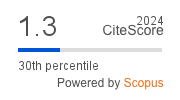Effect of IL-1 and gustducin expression change on bitter taste during fever
Vol. 41 No. 2 (2008): June 2008
Articles
June 1, 2008
Downloads
Sunariani, J. (2008). Effect of IL-1 and gustducin expression change on bitter taste during fever. Dental Journal (Majalah Kedokteran Gigi), 41(2), 95–99. https://doi.org/10.20473/j.djmkg.v41.i2.p95-99
Downloads
Download data is not yet available.
- Every manuscript submitted to must observe the policy and terms set by the Dental Journal (Majalah Kedokteran Gigi).
- Publication rights to manuscript content published by the Dental Journal (Majalah Kedokteran Gigi) is owned by the journal with the consent and approval of the author(s) concerned.
- Full texts of electronically published manuscripts can be accessed free of charge and used according to the license shown below.
- The Dental Journal (Majalah Kedokteran Gigi) is licensed under a Creative Commons Attribution-ShareAlike 4.0 International License

















